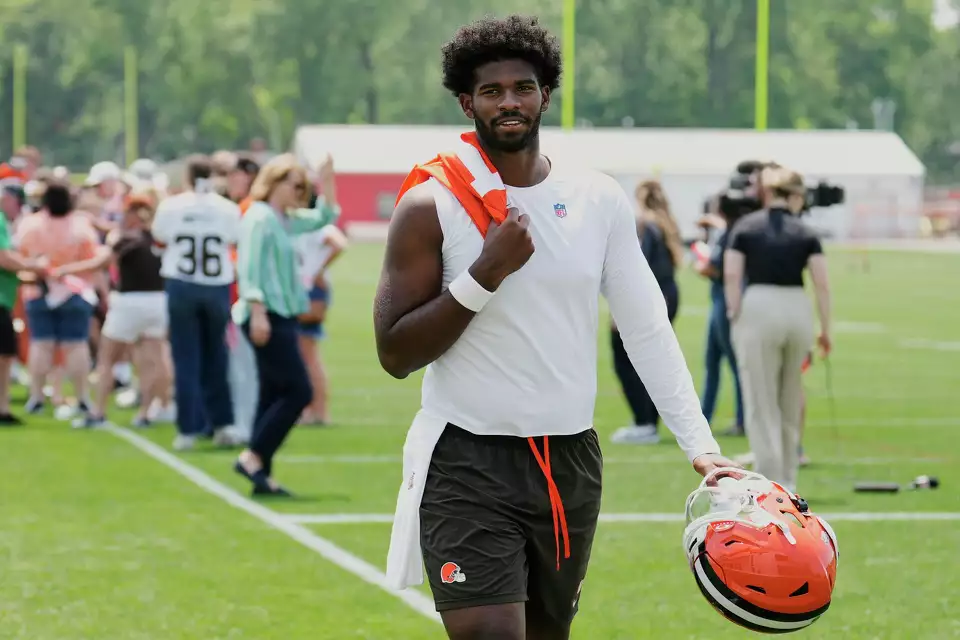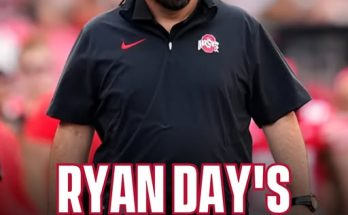Shedeur Sanders entered the NFL with a pedigree unlike many rookies. The son of Pro Football Hall of Famer and current Colorado Buffaloes head coach Deion Sanders, Shedeur carries not only the expectations of a talented quarterback but also the legacy of one of the most electrifying figures in football history. Drafted by the Cleveland Browns in the 2025 NFL Draft, Sanders was touted as a potential franchise quarterback of the future. Yet, less than two months into team activities, whispers out of Berea suggest that the transition to the professional level may be rockier than anticipated.
Despite his potential, Shedeur Sanders is facing serious difficulties in the Browns’ quarterback competition—a battle complicated by the presence of veteran signal-callers, high organizational stakes, and the unique challenges that come with stepping into the NFL as a high-profile rookie. Let’s unpack the reasons why Sanders’ path to the starting job is more complicated than fans might expect.
The Quarterback Room: A Crowded and Experienced Field
The Browns’ quarterback depth chart is currently one of the more complex in the NFL. Deshaun Watson, still under a lucrative and controversial fully guaranteed contract, is expected to start if healthy. Despite his inconsistency and injuries over the past two seasons, the team has continued to publicly support Watson, often citing his ceiling as an elite dual-threat quarterback when fully locked in.
Behind Watson, the Browns brought back a pair of serviceable veterans in Jameis Winston and Dorian Thompson-Robinson. Winston, a former No. 1 overall pick, has shown flashes of brilliance in the past, though his inconsistency and turnover issues remain a concern. Thompson-Robinson, a fan favorite from UCLA, impressed in limited action in 2023 and has steadily gained the trust of the locker room.
Into this mix walks Shedeur Sanders. Despite his stellar college production and high football IQ, he finds himself buried on a depth chart packed with experience and expectation. Unlike Caleb Williams or Drake Maye, Sanders wasn’t drafted to be the immediate face of a franchise. The Browns see him as a long-term asset—a development project who could, in time, take the reins. But in the high-stakes world of professional football, time and patience are luxuries often in short supply.
Adjusting to the Speed and Complexity of the NFL
At Colorado, Shedeur Sanders put up jaw-dropping numbers—over 3,200 passing yards and 27 touchdowns in a single season, often behind a porous offensive line. His poise in the pocket and quick release earned him comparisons to some of the best young quarterbacks in the game. However, the Pac-12 and the NFL are vastly different beasts.
Multiple sources from Browns OTAs have indicated that Sanders is struggling to adjust to the speed of NFL defenses. He’s been sacked repeatedly during 11-on-11 drills, hesitated on check-downs, and forced throws under pressure—remnants of habits formed during his time at Colorado, where he often had to play hero ball just to keep his team competitive.
The learning curve is steep, particularly in an offense designed by Kevin Stefanski that requires quick decision-making, precise timing, and mastery of terminology. Sanders, by all accounts, is a diligent student of the game, but that hasn’t yet translated into consistent execution during live reps. And in a quarterback competition as tight as this one, every misstep is magnified.
Leadership and Locker Room Dynamics
One of Shedeur Sanders’ greatest strengths in college was his leadership. Players gravitated to him, coaches praised his maturity, and his confidence inspired belief—even when the Buffaloes were outmatched on the field. But in the Browns’ locker room, filled with veterans and players who have already endured the ups and downs of NFL life, the dynamics are different.
Deshaun Watson, for all his controversies, still commands a degree of respect as a former Pro Bowler. Jameis Winston, known for his charismatic leadership, has endeared himself to teammates with his passion and effort. Sanders is trying to find his voice in a room where voices are already well-established.
Team insiders suggest that Sanders is keeping his head down and working hard—a wise move for a rookie. But leadership in the NFL isn’t just about speaking up; it’s about proving you belong, day in and day out. Until Sanders shows he can consistently make the throws and move the offense, his ability to take on a leadership role will remain limited.
The Weight of the Sanders Name
It would be foolish to ignore the elephant in the room: Shedeur Sanders is no ordinary rookie. He is the son of Deion “Prime Time” Sanders, a man who redefined the idea of sports celebrity. That legacy brings attention, media scrutiny, and expectations that few 21-year-olds are equipped to handle.
Shedeur has handled the spotlight with grace for most of his football career, but in the NFL, everything is amplified. Every interception in camp becomes a Twitter debate. Every missed read fuels narratives about his readiness. Every sign of frustration is dissected and interpreted. In some ways, Shedeur is being evaluated not just as a rookie QB, but as a brand—and that scrutiny can take a toll.
The Browns, a franchise long accustomed to instability at the quarterback position, are understandably cautious. They’ve seen promising young quarterbacks crumble under pressure before. They don’t want Sanders to be the next name added to that infamous jersey list.
Stefanski’s System: A Double-Edged Sword
Kevin Stefanski’s offensive system, rooted in play-action and West Coast principles, has proven effective when operated by smart, accurate quarterbacks. It’s the kind of system that rewards discipline and punishes improvisation—a potential mismatch for a quarterback like Sanders who excels at extending plays and making off-platform throws.
In college, Sanders was most dangerous when the pocket broke down. He used his mobility and vision to find receivers on scramble drills, often turning broken plays into big gains. But the Browns want rhythm, timing, and structure. Stefanski isn’t looking for a gunslinger; he’s looking for a field general.
That doesn’t mean Sanders can’t adapt—only that he’s being asked to rewire elements of his game. That kind of transition rarely happens overnight, especially against NFL defenses that disguise coverages and blitz packages with surgical precision.
The Future: What Role Will Sanders Play in 2025?
Realistically, Shedeur Sanders is not expected to start in 2025 unless disaster strikes—either in the form of multiple injuries or total collapse by the veterans ahead of him. What the Browns are hoping for is incremental growth. They want to see improved footwork, quicker reads, and a command of the huddle. They want flashes, not fireworks.
The Browns have invested heavily in building a playoff-caliber roster, with a defense that ranks among the league’s best and skill-position players capable of putting up points in bunches. It’s not an environment where experimentation at quarterback is welcomed. They need reliability and consistency.
But the long-term picture is more promising. Watson’s contract, despite its size, is not immune to scrutiny. If he fails to perform in 2025, the Browns may begin to look elsewhere. Jameis Winston and Dorian Thompson-Robinson are unlikely long-term solutions. If Sanders can quietly develop into a polished NFL passer, he may be poised to take over the reins in 2026 or 2027.
For now, though, he faces an uphill climb.
Final Thoughts: Growing Pains Are Normal—But the Clock Is Ticking
Shedeur Sanders is one of the most intriguing young quarterbacks in the NFL. His blend of poise, mechanics, and moxie made him a standout in college, and those traits haven’t disappeared just because he’s hit a few bumps in rookie camp.
But the NFL is a results-driven league. Talent must translate into performance, and performance must translate into wins. The Browns believe in Shedeur Sanders, but belief alone won’t earn him snaps. He must evolve—quickly—while also learning to manage expectations that few rookies face.
The journey from college star to NFL starter is rarely linear, and it’s filled with moments of self-doubt, setbacks, and recalibration. Sanders has the makeup to weather those storms. The question is whether he can do so in Cleveland—a city where quarterback dreams have too often been dashed by time, pressure, and misfortune.
If he can, the reward will be immense. If not, he may simply become another chapter in the Browns’ ever-complicated quarterback saga.



